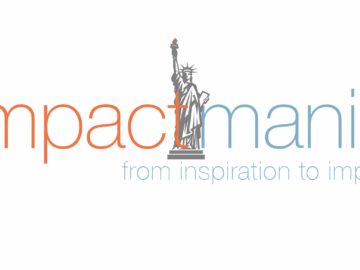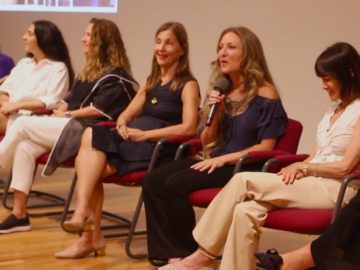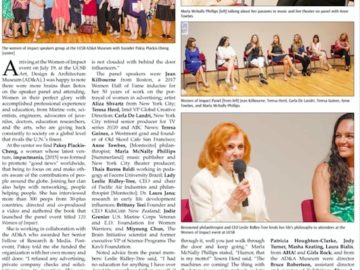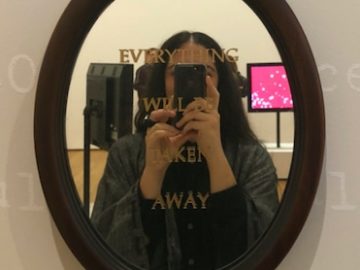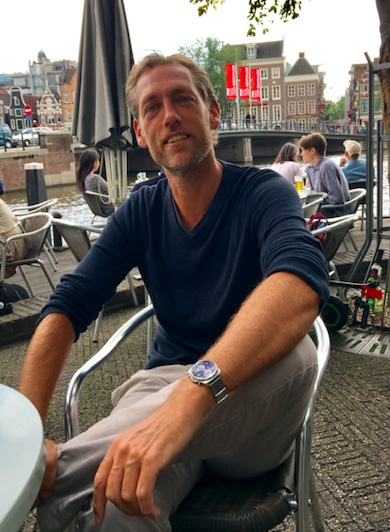
Reinier Evers, founder of Trendwatching, in Amsterdam, the Netherlands, August 2017. Photo: impactmania.
impactmania’s contributor Jody Turner spoke with serial entrepreneur Reinier Evers.
Reinier Evers is a highly influential global innovator in the insights and strategic information industries having founded the global platforms TrendWatching, Springwise, and Qusus. An accomplished trend-watcher, entrepreneur, and presenter across the globe, Reinier holds a Master’s degree in Economics from the University of Amsterdam, and studied Business Policy at New York University. Reinier has been a keynote speaker at multiple industry events, workshops, and conferences in Europe, North America, Asia Pacific, Africa, and South America. He is a quoted trend-expert in numerous business publications, including Time Magazine and the New York Times.
BY JODY TURNER
Reinier, it is a pleasure to interview you. You are a long time business associate and friend who generously sent me around the world speaking for you time and time again. I thank my lucky stars we met in France that day…
Yes, we met in 2004 at the Four Seasons Terre Blanche resort in Provence, France where we were both wandering around looking for “wifi.” It is hard to imagine but back then it was not everywhere and was considered a little elite. Both of us were immensely curious about the online world and what we could do with it. We were making the best use of what it offers; globally connecting with strangers, facilitating demand and supply online, a perfect match between the two. Then it was all about finding and distributing whatever to whomever; including ideas, opinions, insight, tasks, jobs, and projects.
This remains fascinating to this day, but then it was new, still early days. We were quite good at adopting it straight away and that always means opportunity, first-mover advantage. Still all the attention then was real attention, a flocking to something interesting and new. We still do this but in a different way. Then it was exciting to be reached out to… and to reach out to whomever we wanted to, and they would respond, famous or not.
Can you talk a little about first-movers?
You [Jody Turner] and I met through Kristine Oustrup Laureijs. Kristine co-created the Style-Vision Round Table and is a connector extraordinaire, a first-mover artist who is dynamic when it comes to community, content, and creativity. Over a several year period she brought together amazing creators and innovators to beautiful locations, sharing insights about future trends. This particular Round Table was prior to the opening of the Terre Blanche Provence resort. We gathered as an elite group and were given 3-4 days together and 10 minutes each to present our best ideas forward. It was over many dinners and over learning how to make puff pastry from a famous Parisian chef that we bonded and shared the best information we had.
Kristine moved on to create many other influencer communities and works today in Singapore as an installation artist around the theme of cross-cultural connections via food. Her projects influence leaders and spread ideas broadly, she is a transformer to a high degree. You and I were grateful to meet, as others have been, at her ignition event.
Tell us about the company you founded back then which is now the go-to source in the strategic insights field across the globe.
TrendWatching began in 2002 when I had sold Urbanbite, the too early food delivery portal. A business industry that now gets billions in funding does everything we predicted it would do, but we were fifteen years too early. The sale of Urbanbite gave me money and time to travel and think. I was able to see innovations around the globe and saw that no one was sharing this type of content other than a few trend leaders who put out a book once a year and charged a great amount for a consultation fee.
I decided to put future innovation content I had collected online and share it broadly, the TrendWatching platform was born. As I say regularly, [Jody Turner: “Readers beware, the following is Reinier’s dry way of joking!”] “TrendWatching single handedly created the entire online trend world and everyone reading this online and in Jody’s upcoming book should be grateful to me!” Actually, we were all a bit too early in this endeavor as well, but this time it was to our advantage.
This was back in 2002, correct? I remember telling everyone about it, and it was beginning to fly about the planet…
In 2002, this idea was so new that people were really keen on it. Newsletters online were so unique and cool that we had 10,000 subscribers in a month. Today there are 250,000+ subscribers and 1,000+ Premium clients.
We were the first to crowdsource trend and innovation content, and had a strong community of contributors. Today we have 3000+ spotters globally. Next, and quite naturally, companies began asking us to present, and work on projects, which became our next step.
What we did right was to pretend to be American or British — we were not from Amsterdam. Why? We presented ourselves in the big, global, larger than life American way. Americans would hire me and they expected an American, which was the same with the British. No one knew how young I was either. They were in shock when I showed up for meetings or to present — that was always funny.
How did you differentiate from what was happening at the time?
We were irreverent and always on the side of the consumer. We never asked for work, only worked for people that wanted to work with us. You had to come to us, we knew then you wanted what we offered.
Seed-funding was my own money so I kept it very small at first by making the best use of online distribution. The spotter network did a lot of the work for us. I offered really nice gifts, top end, and exposure. We would ship these gifts all over the world, Egypt, India, and Canada. I worked with Lisbeth den Toom as my right hand person. She was a one-of-a-kind, unique person who gets it, has a certain class and background with extreme talent and extreme dedication. She was our researcher, writer, organizer and producer. We were a very lean and mean machine.
When did it really take off?
TrendWatching started scaling when we started selling reports digitally. After a few years it was great. Our model was to keep it small and not rely on consulting for our livelihood. The reports and subscription service to the database freed me from the hour-to-hour consulting day and night for larger business ideas and innovation.
Wait a minute, as I remember you came up with terms like Pop-Up, correct?
Yes, another thing we did right at the beginning was to create descriptive trend words and own the domain name. For instance, we came up with Pop Up, Pop Up Store/experience — please don’t put that on my tombstone. Another is Massclusivity, or exclusivity for the masses, there is a great deal of press on that one. Online Oxygen was great. Generation C for the generation that focused on content, creation, and making things instead of consuming things. Branded Brands was another, working together and co-branding. Haagen-Dazs with Godiva Chocolate within the ingredients for instance. Transumers — don’t own, they just rent. Sellsumers are consumers that make money by selling things. This was all new to society; we were pleasantly early on all of this. It was easy because we were and are really tapped into what is happening. We were doing all of this when many were saying this Internet thing was not going to last.
And we know the end to that story, or the beginning really.
One day there was a shift to everyone living online. We were so globally oriented that everybody was going after every bit of content anywhere in the world. As Henry Mason our current and brilliant CEO has said, it used to be someone from India that would send us happenings from India, then one day the happenings in India came from Tokyo, São Paulo, China or the U.S. We were globally accessed concurrently.
In your words, what did this do to our insights industry?
Trends went from something you were very worried about missing out on, to something that you weren’t worried about at all. If it is truly important it will come to you. We were all so tapped in with so many providing it, if you connect and inform yourself, it will find you.
And today?
Today it comes from all angles; so many angles that today you need personalized translation. Editorial and curation is key.
Today TrendWatching is a source of inspiration for many people. For avid users or clients you can find something when you need it, it is added validation. It still tells you where consumerism is headed and on a more global level than ever it is a tool. The methodology processes, exercises, trend radar, and trend framework — much of it is still free. But so much more available on the site is paid; today it’s a balance of the two. The TrendWatching leadership of Henry Mason and team rightly feel this is the way to go today.
Does the word “trend” serve us any more?
There will always be trends but at the beginning the word felt superfluous and light. Today we see it as the deeper and more meaningful tracking of human behaviors. Those that are at the top are looking for disruption and opportunity that bring innovation in a deeper moving way and may not use the word “trend”. Yet TrendWatching does serve global marketing and branding, innovation product development executives.
Almost in parallel, I created Springwise. TrendWatching made money, Springwise was a side-project and was the early on entrepreneurial or startup business innovation tracker. TrendWatching was what marketers wanted, but Springwise captured the cool innovations from Argentina to Singapore. We had a huge audience looking for new businesses; we had a large subscriber base, each business featured got a wave or attention. We never managed to properly monetize it, we didn’t have the time for it.
I sold this to a very passionate and clever British entrepreneur named James Bidwell and he is building Springwise out beyond tech to include the maker, innovator culture. He is adding more engagement and events.
My new project is Qusus (quiz us). Based in New York and Amsterdam, Qusus is a platform that collects, curates, and champions suggestions and ideas for products and services. We give smart people around the world the voice to influence brands and organizations for the better. Make the world better, get rewards, be a contributor, shine within your community.
Living in the Creative Zone, Transforming the World One Idea at a Time is a collection of interviews with international figures driving change forward through purpose and passion projects. For the next year these interviews will publish on the impactmania platform, Jody Turner’s complete e-book is available in fall of 2018.

